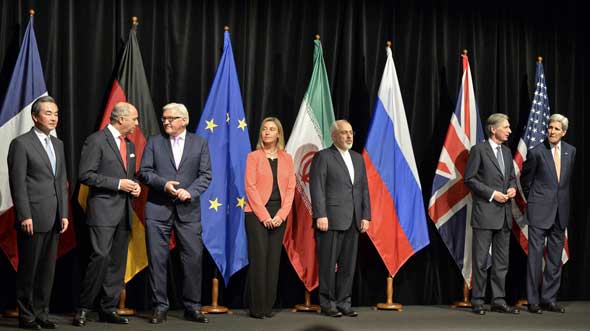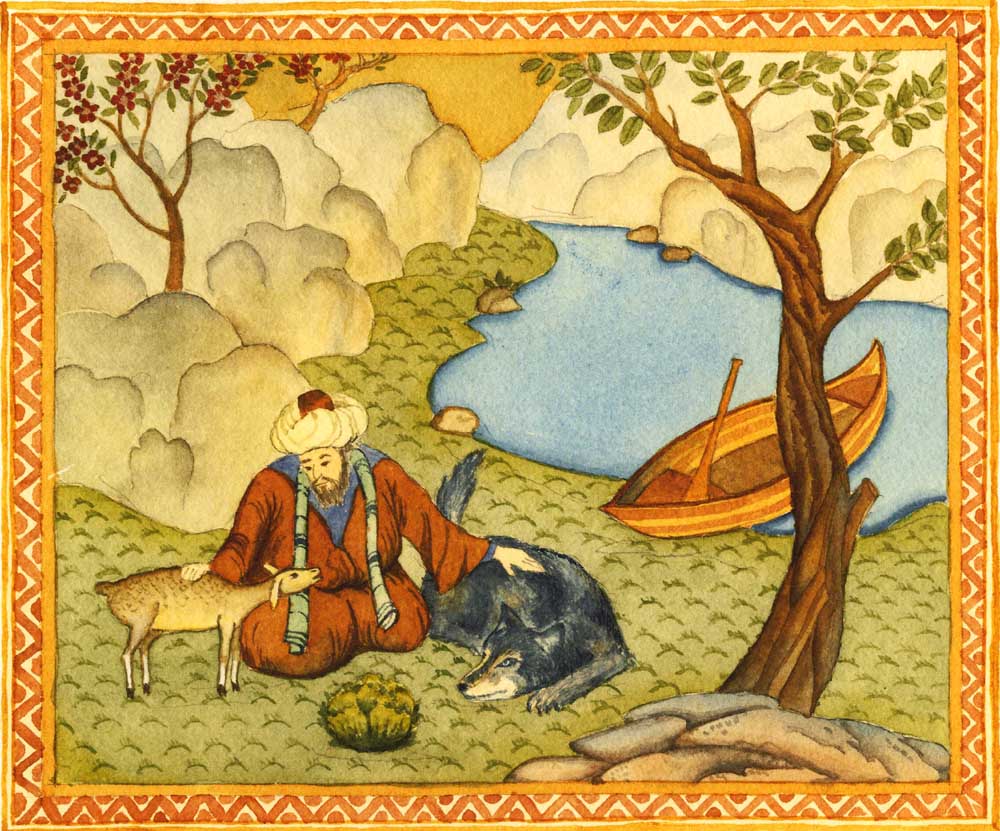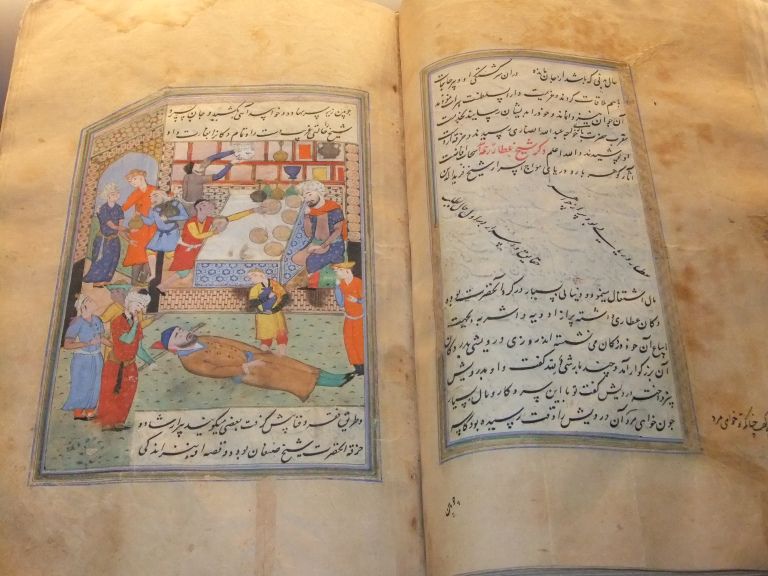
The ministers of foreign affairs of France, Germany, the European Union, Iran, the United Kingdom and the United States as well as Chinese and Russian diplomats announcing an Iran nuclear deal framework in Lausanne on 2 April 2015. The framework deal became the basis for a final agreement, the Joint Comprehensive Plan of Action, which was agreed on 15 July 2015.
Photo:Wikipedia (P5+1)
In the early hours of Sunday 24 November 2013, in the Palace of Nations in Geneva, the United States and five other world powers announced a first-step landmark agreement on Iran's nuclear programme, laying the foundation for a more sweeping agreement.
The aim of the accord, which is to last six months, is to give international negotiators time to pursue a more comprehensive pact, given this new confidence-building measure, dialogue, understanding and trust.
Shortly after the agreement was signed President Obama hailed it as the most “significant and tangible” progress of a diplomatic campaign that began when he took office. “Today, that diplomacy opened up a new path toward a world that is more secure” he said. UK Foreign Secretary William Hague said the agreement was "good news for the whole world", whilst the French Foreign Minister, Laurent Fabius noted that "After years of blockages, the agreement in Geneva on Iran's nuclear programme is an important step to preserving security and peace."
The Iranian foreign minister, Mohammad Javad Zarif, said he hoped the agreement would lead to a “restoration” of trust between Iran and the United States. He reiterated Iran’s long-standing assertion that its nuclear programme was peaceful, adding that the Iranian people deserved respect from the West. (The 2013 Accord was then finalised as the Joint Comprehensive Plan of Action on 15 July 2015, see above).
It goes without saying that I am indeed very happy to see this agreement. I see this as the “Triumph of Diplomacy for the Common Good.”
Given this, I very much wish to share with you a piece I had written awhile back and which originally was published on 6 May 2006, over eight years ago before today’s announcement of the accord between Iran and the P5+1.
As the Founder of the Globalisation for the Common Good Initiative, and as a person who has embraced spiritual economics, I always thought that there must be a better way, a more just path, to reconcile the West (US) and Iran. I felt that they must move away from concentrating mainly on the material aspect of their relationship to a more spiritual appreciation of who they are, what they believe in, what they share and what they have in common.
I strongly felt that this must be the first step, moving back from “All options are on the table”, and “Death to America- The Great Satan”, to a more meaningful dialogue for the Common Good: A Dialogue of Civilisations, the Dialogue of Discovery and Hope, celebrating our common humanity, kindness, trust, dignity, mutual respect and love.
But, the question was how this may happen, how it may begin? The answer, I believe, rests in Spiritual Diplomacy for the Common Good: Choosing love which is the path to world peace with responsibility.
In a simplistic sense, as it has been noted, the idea is to see spirituality, universal human themes, religion and God as part of the solution to conflicts, as opposed to part of the problem. The tools and mechanisms that emerge from centuries of spiritual quests may provide a basis for communication, understanding and ultimate agreement.
I feel very pleased and humbled to have written the article, “Iran and the US: A Mystic and Poetic Path to Conflict Resolution and Peace Making” in 2006.
I firmly believe that Spiritual Diplomacy, Spiritual Economics, embracing the Common Good have major consequences and positive impact on how we should conduct negotiations, leading to a rewarding and fruitful dialogue, agreement and accords.
Here you have it. I hope you will find the article below of interest and meaning as you formulate your own thoughts on these vitally important global issues.
Iran and the US: A Mystic and Poetic Path to Conflict Resolution and Peace Making
By Kamran Mofid 6 May 2006
A few years ago, at a time of reflection on my professional life, and searching for a complimentary model to today's Western and mainly money, capital and technology-dominated model, I turned to my land of birth, Persia. I then rediscovered Rumi, Sa'adi and Hafez. That journey has been full of joy, inner-peace and happiness for me.
Recently, in my research for a forthcoming book on economics, capitalism and happiness, I have discovered more Persian gems, amongst them, Farid al-Din 'Attar. I have found his writings very relevant to today's global environment, on what we need to overcome our differences, address our crises and to solve our conflicts non-violently.
Attar’s poetry and literature promote the language of dialogue and diplomacy

Attar is one of the most famous mystic poets of Iran. His works were the inspiration of Rumi and many other mystic poets. Attar, along with Sanai were two of the greatest influences on Rumi in his Sufi views. Rumi has mentioned both of them with the highest esteem several times in his poetry. Rumi praises Attar as follows: 'Attar has roamed through the seven cities of love while we have barely turned down the first street.'
Attar was beheaded by the invading Mongol army in 1221. His tomb, in Neishabour, Khorasan Razavi Province, Iran, attracts many visitors throughout the year. Phot:bing.com
I thought I cannot wait to share some of my discoveries with you until my book is published in a year or two. So, here, I want to share with you what Attar has to offer on love and spirituality- so much missing today and so much needed for a peaceful and just conflict resolution. These are the seeds that Attar and others like him have planted, and have germinated over centuries, growing into a garden into which you are about to step.
My main purpose in this short paper is then to apply my reading of Attar to construct a model, based on love and spirituality, to bring Iran and the US together again for the common good.
First, a brief note on Attar (ca. 1142 - ca. 1220). He was born in Neishapour, in the Iranian province of Khorasan, and died in the same city. Some scholars believe he was killed during the raid and destruction of his city by the Mongol invaders. His tomb is in Neishapour. As for example, the great Inayat Khan has observed, Attar is one of the most ancient poets of Persia, and it is no exaggeration to say that the work of Attar has been the inspiration of Rumi and of many spiritual souls and many poets of Persia. Rumi praises Attar as such: "Attar roamed the seven cities of love-we are still just in one alley."
Attar has pointed out the way to the ultimate aim of life, by making a sort of picture in a poetic form. He was very prolific. The number of his works is said to equal the number of suras in the Qur'an, i.e., one hundred and fourteen. About thirty or so survive, among them, moral treaties, love stories, prose biographies of saints, a collection of quatrains, the most magnificent Mantiq at-Tayr ("The Bird of the Sky"), known in English as the Conference of the Birds, from which we have taken the idea of the "Blue Bird" or the "Bird of the Sky." This is a very ancient teaching, through the use of the Persian word "Sky." This points out that every soul has a capacity which may be called the sky, and this capacity can accommodate the world or the heaven, whatever it would partake of and hold in itself.
As Inayat Khan has remarked, when one walks in the crowd, what does one see? One sees numerous faces. I call them various attitudes. All that you see in individuals, all that stands before you, has expression, has atmosphere and has form. If you call it by one name, it is the attitude: the attitude they have towards life, right or wrong, good or bad. Whatever attitude they have, they are themselves that attitude.
Plainly speaking, whatever one makes of oneself, one becomes that- a source of happiness or unhappiness, all is in man himself. When he is not aware of this, then he is not able to arrange his life; and as he becomes more acquainted with this secret, he gains mastery, and it is the process with which this mastery is attained which is the only fulfilment of his life. It is that process which is explained by Attar in his work with the seven valleys through which this Bird of the sky had passed.

A manuscript by Farid Al Din Attar kept in Pergamon Museum, Berlin, Germany.
Photo: Wikipedia.
I will now identify Attar's seven valleys and then for the purpose of this short paper, will discuss and elaborate more on the valley of love.
The seven valleys are:
1- The Valley of the Quest,
2- The Valley of Love,
3- The Valley of Understanding,
4- The Valley of Independence and Detachment,
5- The Valley of Unity,
6- The Valley of Astonishment and Bewilderment,
7- The Valley of Deprivation and Death.
Attar on "The Valley of Love"
The whole world is a marketplace for Love,
For naught that is, from Love remains remote.
The Eternal Wisdom made all things in Love.
On Love they all depend, to Love all turn.
The earth, the heavens, the sun, the moon, the stars
The centre of their orbit find in Love.
By Love are all bewildered, stupefied,
Intoxicated by the Wine of Love.
From each, Love demands a mystic silence.
What do all seek so earnestly? "Tis Love.
Love is the subject of their inmost thoughts,
In Love no longer "Thou" and "I" exist,
For self has passed away in the Beloved.
Now will I draw aside the veil from Love,
And in the temple of mine inmost soul
Behold the Friend, Incomparable Love.
He who would know the secret of both worlds
Will find that the secret of them both is Love.
Farid al- Din Attar, in Essential Sufism, James Fadiman and Robert Frager
"The next valley is the Valley of Love. To enter it one must be a flaming fire--what shall I say? A man must himself be fire. The face of the lover must be enflamed, burning and impetuous as fire. True love knows no after-thoughts; with love, good and evil cease to exist. "But as for you, the heedless and careless, this discourse will not touch you, your teeth will not even nibble at it. A loyal person stakes ready money, stakes his head even, to be united to his friend. Others content themselves with what they will do for you tomorrow. If he who sets out on this way will not engage himself wholly and completely he will never be free from the sadness and melancholy which weigh him down. Until the falcon reaches his aim he is agitated and distressed. If a fish is thrown onto the beach by the waves it struggles to get back into the water. "In his valley, love is represented by fire, and reason by smoke. When love comes reason disappears. Reason cannot live with the folly of love; love gas nothing to do with human reason. If you possessed inner sight, the atoms of the visible world would be manifested to you. But if you look at things with the eye of ordinary reason you will never understand how necessary it is to love. Only a man who has been tested and is free can feel this. He who undertakes this journey should have a thousand hearts so that he can sacrifice one at every moment." (from a translation by C.S. Nott)
Reflecting on "The Valley of Love", Inayat Khan notes that, love has its time in every stage of life. As a child, as a youth, as a grown-up person, in whatever stage of life one has reached, love is always asked for and love has always its part to perform. There is only one thing in the world, and that is pure unselfish love, which shows the sign of heaven, which shows the divine sign, which gives the proof of God. For all the noble qualities which are hidden in the soul will spring forth and come to bloom when love helps them and nurture them. Man may have a great good in him, and he may be very intelligent, but as long as his heart is closed he cannot show that nobleness, that goodness, which is hidden in his heart.
And the psychology of the heart is such that once one begins to know that heart life is a continual phenomenon, every moment of life becomes a miracle. It throws a searchlight upon human nature, and all things become so clear to him that he does not ask for any greater phenomenon or miracle: it is a miracle in itself.
Love sees the Beloved and nothing else. As Rumi says, "Whether you love a human being or you love God, there will come a day when all lovers , either of man or of God, will be brought before the throne of Love and the presence of that only Beloved will reign there." What does this show? In loving our friend, in loving our neighbour, even in the love that one shows to one's enemy, one only loves God.
In all, either we live with our human limitation, or let God reign with His unlimited being. In other words, we take away the home which always belonged to someone else and fill it with delusion and call it our own; and not only call it our own, but call it our self. That is man's delusion, and all religious and philosophical teachings are given to rid man of this delusion, which deprives him of his spiritual wealth. Spiritual wealth is the greatest wealth and spiritual happiness the only happiness.
In conclusion, what can we learn from the above to envision and enable us to offer a non-violent and spiritual path to conflict resolution and peace making between Iran and the US?
Since the revolution in Iran, many Iranians have marched and shouted, "Marg bar Amrika: Death to America". The US has imposed punitive sanctions on Iran and has called one of the most ancient civilisations known to man, "An axis of Evil". This is a clear sign of weakness and hatred, not of strength and wisdom. More recently they are at logger heads on Iran's nuclear programme.
This proposal to Iran and the US is both timely and much needed. In a recent survey conducted for the BBC World Service, by GlobeScan and the University of Maryland, Iran was most widely viewed as having a negative influence in the world; followed in second place by the US. 39,433 people in 33 nations across the world were asked how they saw various countries. The survey was carried out between October 2005 and January 2006. (BBC News 03.02.2006)
This kind of behaviour is a shameful example of a loveless and spiritually dead foreign policy. This demonstrates a profound lack of wisdom in both parties. Have they not read Attar, Rumi, Sa'adi and Hafez? Don't they know the magnificent power of love, mysticism and spirituality and their role in managing conflict? In the interest of humanity and accountability to a higher force than their own mortal selves, then, they should (both parties that is). If they understand and acknowledge these values in their relationship, then, every other issue becomes manageable.
Sources:
Coleman Barks (Translation by), Lectures by Inayat Khan, The Hand of Poetry: five Mystic poets of Persia-Sanai, Attar, Rumi, Sa'adi and Hafez, Omega Publications, New Lebanon, NY, 1993
Marcus Braybrooke and Kamran Mofid, Promoting the Common Good: Bringing Economics and Theology Together Again, Shepheard-Walwyn, London, 2005
Related Links for Further Reading:
Modern Iran: The Most Misunderstood Country
Cradle of god: Spirituality in the Land of the Noble
Revisiting the Persian cosmopolis: The World Order and the Dialogue of Civilisations
